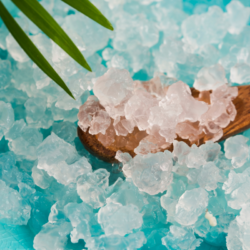All soy products, such as tempeh, tofu or soy-based vegetable drinks, are very rich in plant protein. Soy protein is also available in powder form. It can be used to supplement a sports training it can also be used to make up for any protein deficiencies. Many people do not consume enough protein on a daily basis. People who eat a plant-based diet or who do not eat dairy products can turn to soya for its protein, vitamin and mineral content. Although some people believe that soy is a nutrient powerhouse, others wonder if it has any undesirable side effects.
Soy products
Soy comes in many different forms, all of which contain their own nutrients and benefits. Firstly, there are whole soy foods or minimally processed products:
- Tofu. It is made from condensed soy milk in a process similar to cheese making. It is shaped into solid, spongy white blocks of soybean curd.
- Tempeh. This dense, nutty cake or patty is made by partially cooking whole soybeans and then fermenting them.
- Miso. This tasty paste is used in soups and other recipes. It is made from fermented soybeans and barley or rice malt. It is used as an alternative to bouillon cubes.
- Natto. Usually served with rice, this sticky Japanese dish is made from fermented soybeans. It is usually served over rice.
Even more processed products
The vegetable drink made from soya is a slightly more processed product. In fact, to make it, you have to cook the soybeans in water. Then they have to be crushed and pressed. Before bottling, manufacturers are free to add ingredients such as flavourings, thickeners or nutrients. Soy protein isolate or protein powder, on the other hand, is a highly processed derivative. These powders can be found in products designed for sportsmen and women, such as high-protein bars and other products exercise drinks. Note that soy protein isolate is obtained from defatted soy flakes that have been washed in alcohol or water to remove sugars and fibre. Finally, they are dehydrated and powdered before being marketed.
Soy and phytoestrogens
In general, many people avoid eating soybeans because of their phytoestrogen content. This is because of the fear of disturbing their hormonal balance. Phytoestrogens are plant compounds that are structurally similar to female sex hormones (oestradiol) and may have oestrogenic activity. For this reason, many people fear that soya may promote the development of breast cancer or have a negative impact on male hormones. However, research has not shown that soy products promote breast cancer or that they alter male reproductive hormone levels.
Should we avoid eating soy?
There is no doubt that soy is an excellent source of protein, fibre and nutrients. All of which are essential for the proper functioning of the body. Isoflavones in particular. Isoflavones are compounds belonging to a family called flavonoids, which in turn belong to the broad group of polyphenols. Polyphenols are found in most plants, flavonoids in a large number of plants. In fact, eating minimally processed soy products, such as tofu or tempeh, can be beneficial for heart health, blood sugar control, weight loss and even cancer risk.
Sources: https://fdc.nal.usda.gov/fdc-app.html#/food-details/1097542/nutrients https://fdc.nal.usda.gov/fdc-app.html#/food-details/174276/nutrients https://www.ncbi.nlm.nih.gov/pmc/articles/PMC8398613/ https://pubmed.ncbi.nlm.nih.gov/27723080/ https://pubmed.ncbi.nlm.nih.gov/33383165/





